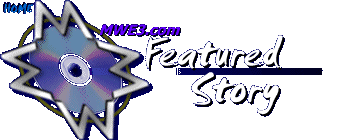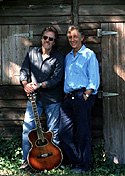|
Part
2
continued from
previous page
RS:
I know you played a lot of the guitars on the Chad & Jeremy albums
but can you remember some of the other guitar players who worked with
Chad & Jeremy in the studio?
CS: In the Columbia days I would say the one who was most prevalent,
the only one really, was Glen Campbell. Yeah, he was definitely there
on a lot of that stuff. He would play on the basic tracks, because the
basic tracks weren’t that basic actually. They were like keyboard,
guitar, bass, drums, and maybe vibes and percussion. I was Mr. Arranger.
I did the charts and I liked to be able to hear the results in the control
room and then I would overdub later. Going further back, the highly
respected session player, Big Jim Sullivan was on the early British
tracks, including that ill-fated song that Jeremy wrote called “Ballad
Of A Teenage Failure.” We delight in telling our audiences that
story about how Paul Simon had given us “Homeward Bound” to
record, which we did, but we didn’t put it out as a single. We
released Jeremy’s “Teenage Failure” which lived up to
it’s name! The other guy who will completely amaze you is Jimmy
Page. Jimmy played rhythm guitar on some of the really early stuff.
The album produced by Shel Talmy, I think it was. I vividly remember
Jimmy on one or two sessions wearing a suit, really short hair, not
terribly interested but he needed the money. I’d love to have met
him since then and apologize and say look, I was a kid, I didn’t
know any better. There I was doing some jingly pop tune y’know?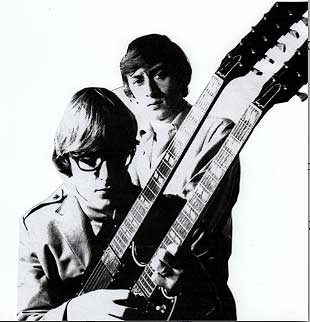
RS: He went on to play guitar with The Yardbirds…
CS: The Yardbirds were probably rehearsing in the evenings. He still
had his day gig as a session player.
RS: Of Cabbages And Kings and The Ark. Do you have a preference
or did one come out of the other?
CS: C & J's new favorite word is evolution. We now call it the ‘E’
word. Yes, The Ark evolved out of Cabbages And Kings,
and to me now, the new studio album is again part of this evolution.
It’s almost like we went to sleep for a several decades and then
we woke up and picked up where we left off. The difference, primarily
is, the tools we now have at our disposal. God bless the Japanese for
making them more affordable. Back in the day, it took a lot of money
to have a studio in your house. I ended up getting some reel to reels
and some basic gear. It was very primitive compared to now. Now, everybody
and his mother has superb digital gear or they’re recording on
Pro Tools or whatever. So the game has changed completely. I have a
studio in an A-frame above my garage and it’s got a bunch of Fostex
digital recorders in it and Alesis effects processors and Mackie mixers.
I’m an old fashioned guy! I mixed an album on Protools once and
that was it for me. It's a fantastic system, but in my case you can't
teach an old dog new tricks.
RS: I was watching you on the Hullabaloo DVD on MPI the other night
with that Gibson double neck. You were the first to use it, even before
Jimmy Page.
CS: I sold it at the end of the Sixties. A dumb move. It’s quite
valuable now.
RS: Did you use it on The Ark?
CS: I don’t think I ever did. It was so freaking heavy! It
was really for live. It made no sense in the studio. There was a lot
of fiddling about with acoustic instruments on The Ark and Cabbages.
They tended to be goofy instruments like the Ukelin, a strange Victorian
cross between a ukelele and a mandolin. I was into collecting strange
instruments back then. I think “Paxton Quigley’s Had The Course”
(on The Ark) had one of the very first guitars that had a bridge
pickup coupled with an electric pickup for that little nasty sounding
riff. (sings riff) That was a very strange little guitar. It was something
odd. It was like a Harmony or something. No, maybe it wasn’t a
Harmony. I don't remember now. I was always looking out for odd instruments
at flea markets. On both Cabbages and The Ark, there were
a lot of flea market toys. Cabbages had a lot of silly stuff
on it too, like ping-pong tables in the studio and toilets flushing.
It was pretty wacky. If I had my druthers, I’d definitely go back
with a razor blade and shorten “The Progress Suite.” Probably
in half.
RS: I was reading you weren’t completely happy with that.
CS: I think it came from classical music. I was raised on classical
music, being a cathedral chorister and all that. I was brought up around
it. But it always seemed to me that for classical composers nothing
was ever long enough. If they could possibly repeat it several times
they would. So I sort of took my cue from that. And looking back I think,
‘wait a minute, this could be shortened’ and it would probably
have more impact that way. Paul Kantner, from Jefferson Airplane commented
that Simon & Garfunkel could have said the same thing in three minutes!
That crushed me at the time, but in later years, with hindsight, I tend
to agree with him. Okay maybe not three minutes. (laughter)
RS: Records back then were more like works of art, like Picasso masterpieces.
Why aren’t there many albums today that match the genius of your
‘60s album classics?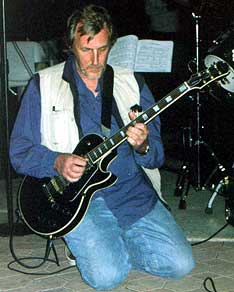
CS: I think it's the swing of the pendulum really. Back then with the
invention of the multitrack recorder and the Mellotron and all the wonderful
new signal processors, it was inevitable that there would be a flowering
of experimentation. Then came the inevitable cultural shift and we found
ourselves in an era of brutal honesty, naked truth and all that. Who
knows? It could swing back again any day now! I like the idea of getting
back to being more adventurous and giving my ideas free rein, but I'll
do more of that later. Right now, the C&J album is more important,
and with that, we've pretty much returned to our roots which are predominantly
acoustic music. I think it’s a sort of an effective compromise
where Jeremy puts the brakes on me a little bit and I try and encourage
him to be more free with his ideas so he’s not just sticking to
simplicity for it’s own sake. There’s a lot of sayings in
our culture, like 'less is more', which have validity, but less isn’t
always more is it? On the other hand, more for it’s own sake can
be seriously over the top, more accurately described as 'wretched excess.'
Gotta watch out for that. One example of things I won't be doing this
time around as we revisit the Columbia years - no gratuitous sitar solo
on “Rest In Peace.” That's a good example of wretched excess
in my book!
RS: I wanted a brief comment on some of your early influences. Hank
Marvin had a big influence on you.
CS: He was a huge influence on everybody at the time. He seduced us
all into learning how to play guitar. Old Hank had this amazingly smooth,
flawless, fluid style. The music was simple, but that's how we all learned.
It was accessible. The catalyst that got Jeremy and I together in the
first place was that when I arrived at drama school, the word reached
him that this new kid had arrived who could play “Apache”
all the way through! My name at the time was David Stuart Chadwick,
and Jeremy started calling me Hank B. Marwick! We started a band called
The Jerks. There was a sort of joke at the time that England was busy
dividing itself into groups of four and playing Shadows tunes, and we
were no exception.
RS: "Summer Song" by the Jerks. It wouldn't have worked! (laughter)
CS: No, not really! Back then, the English had a talent for plagiarizing
the Americans and then reflecting it back to them. And obviously The
Shadows were the English reflection of The Ventures and Cliff was the
English Elvis. Cliff may not have been a serious challenge to the King,
but I think The Shadows knocked spots off The Ventures. Years later,
after The Beatles had changed the musical landscape for ever, I remember
buying the first Marvin, Welch & Farrar album and loving it. Of
course, it was next to impossible to capture the international success
of the early instrumental stuff. When I read your interview with Hank
in the March, 2005 issue, I was struck by the George Harrison quote
about how The Shadows should have put more emphasis on their vocals,
which were really great... The truth is that even if they had done that,
it's really hard to branch out from whatever got you in the public eye
to begin with. It makes me think of the Monty Python line, "And
now for something completely different!" Most of the fans don't
want something completely different. Having said that, I came to the
realization a long time ago that it's not all about how many records
you sell. Over here in the States it's easy to miss out on a lot of
Marvin's later work, just because it didn't make a huge splash over
here. I'm going to go out and buy everything he's ever done post Shadows
and get myself educated! Here's a goofy little footnote...Many years
ago, my son Patrick went to a Shadows gig in England and somehow he
got backstage. When he mentioned who his father was, Hank said, "Not
the Chad Stuart?" which thrilled Patrick to bits! (And me too.)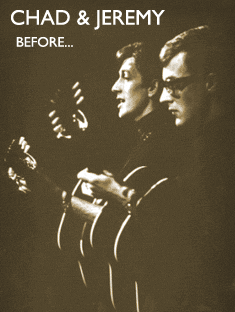
RS: Apart from the double neck, what other guitars did you play and
what do you play now?
CS: Back in the day we both had those John Lennon Gibson acoustics with
the pickup in it. We were sponsored by Gibson until Jeremy left. For
a long time after that all I had was a Martin D-21. Now I take a Rainsong
on the road because it's carbon graphite and impervious to humidity
changes. In the studio I have Martin, Yamaha and Takamine acoustics.
I keep the Yamaha with high octave stringing for overdubs. There's a
couple of Epiphone Les Pauls that I’ve had for years. I used to
play in a band, and still do, on and off, called the KGB (Ketchum Garage
Band). I always played a Les Paul in that band and I’ve slipped
it in a couple of times on this new studio album. They don't get used
much on the C&J stuff, not yet anyway! Last but not least is the
Line 6 Variax. You get such a wonderful palette of sounds out of those.
I had a custom body put on mine to make it more granola looking. Rainy
Day Guitar Works in Ketchum did a fabulous job on that. I don't have
a Strat. right now, which is a bit weird, but the Variax does a pretty
good imitation. I’ve been a Les Paul player for so long that I’ve
sort of ignored the Strat thing. But lately I must say I’ve been
going much more for the single coil pickup. I’ve had one put in
one of my Les Paul’s, so I’ve sort of got the best of both
worlds. You’ve got the humbucker if you want it with the overdrive
or you can go for the clean tone with the single coil.
RS: What's your modus operandi in the studio nowadays?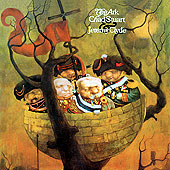
CS. Jeremy lays down his rhythm guitar and a vocal and then it's my
turn. For me, it's like being a sculptor. I like to throw a lot of ideas
down and then pummel them into some kind of cohesive shape. This can
take days or weeks on one song. The final process involves stripping
away extraneous detail. This definitely means that the end result will
be less involved than our work in the Cabbages/Ark era. Hopefully
this won't disappoint you too much! What I'm basically trying to do
now is walk a fine line between high and low tech. Jeremy is very low
tech, which is probably a good thing. Keeps me from going off the deep
end! I’ve got a couple of 16 tracks and a 24 track, which theoretically
I could be using. But for Cabbages and The Ark we used two 8 tracks,
so now we should be able to work on 16’s. If I need to I'll use
both 16's, which is a bit of a laugh, when you think about The Beatles
going 4 to 4. I'll never forget the time when an engineer at Columbia
unlocked a closet and showed me the first analog 8-track. He said, "Now
who could possibly need eight tracks?" Needless to say, Keith Olsen
figured out a way to run two of them together, before Midi sync!
RS: What about live performance and your upcoming plans?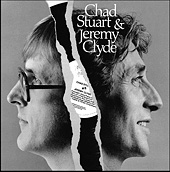
CS: In 2003 we did a show for PBS and that sort of started the ball
rolling. The next year we went out, we were doing 40 minutes on package
shows - dinosaur rock! You know, the ‘60s acts. We called ourselves
the filling in a rock'n' roll sandwich - an acoustic act in between
two rock bands! After a lean and unproductive 2005 which was spent searching
for the right representation, we finally found it in the person of Stephan
Boyd at Icon Performing Arts. We have absolute faith in him. and we
now have our heads together in terms of what we do now, which is a two
hour show with an intermission. We give them songs and stories, old
and new stuff, and sometimes videos when the equipment is there. After
the show, whenever people say it’s just like being in your living
room, that makes my day. There's a phrase that I like, which I read
in a review from the ‘80s tour we did called British Invasion 2.
There was one reviewer who said that we stood out from the pack largely
because we had the courage to admit that we had grown up. Seriously,
what are you gonna do when you turn 50 or 55 and now 60? You gonna prance
around in black leather trousers pretending that you’re 23? I don’t
think so. And it was curious to see that happening in the ‘80s,
with Freddy & The Dreamers and whoever. It was sort of...wait a
minute, we have a lot to be thankful for. At least we’re not trapped
in a persona.
RS: Thanks for the interview. It was a pleasure.
CS: Thank you for dragging me down memory lane.
Thanks to Chad Stuart @ www.chadandjeremy.net
and
Sundazed @ www.sundazed.com

















|
